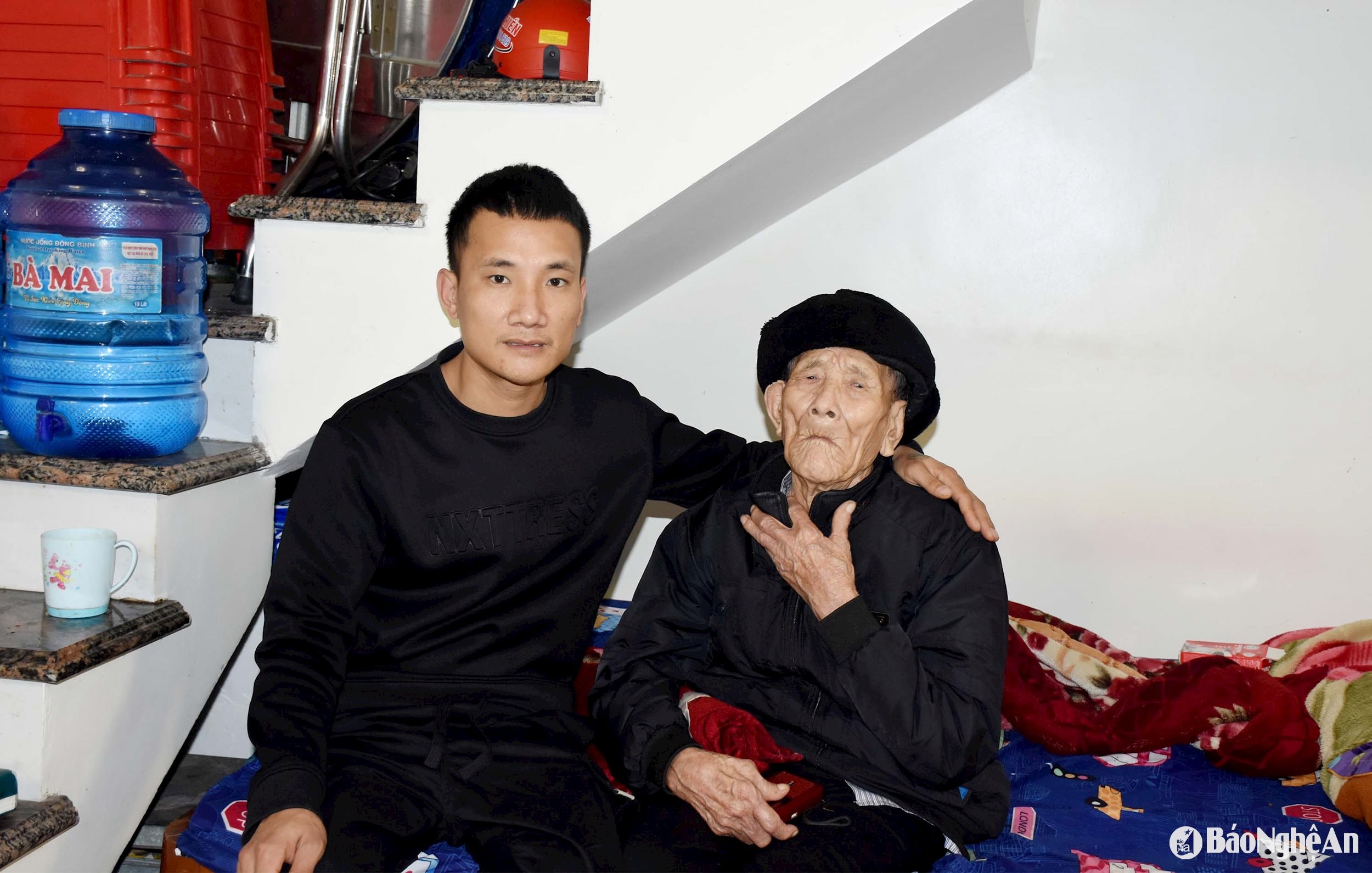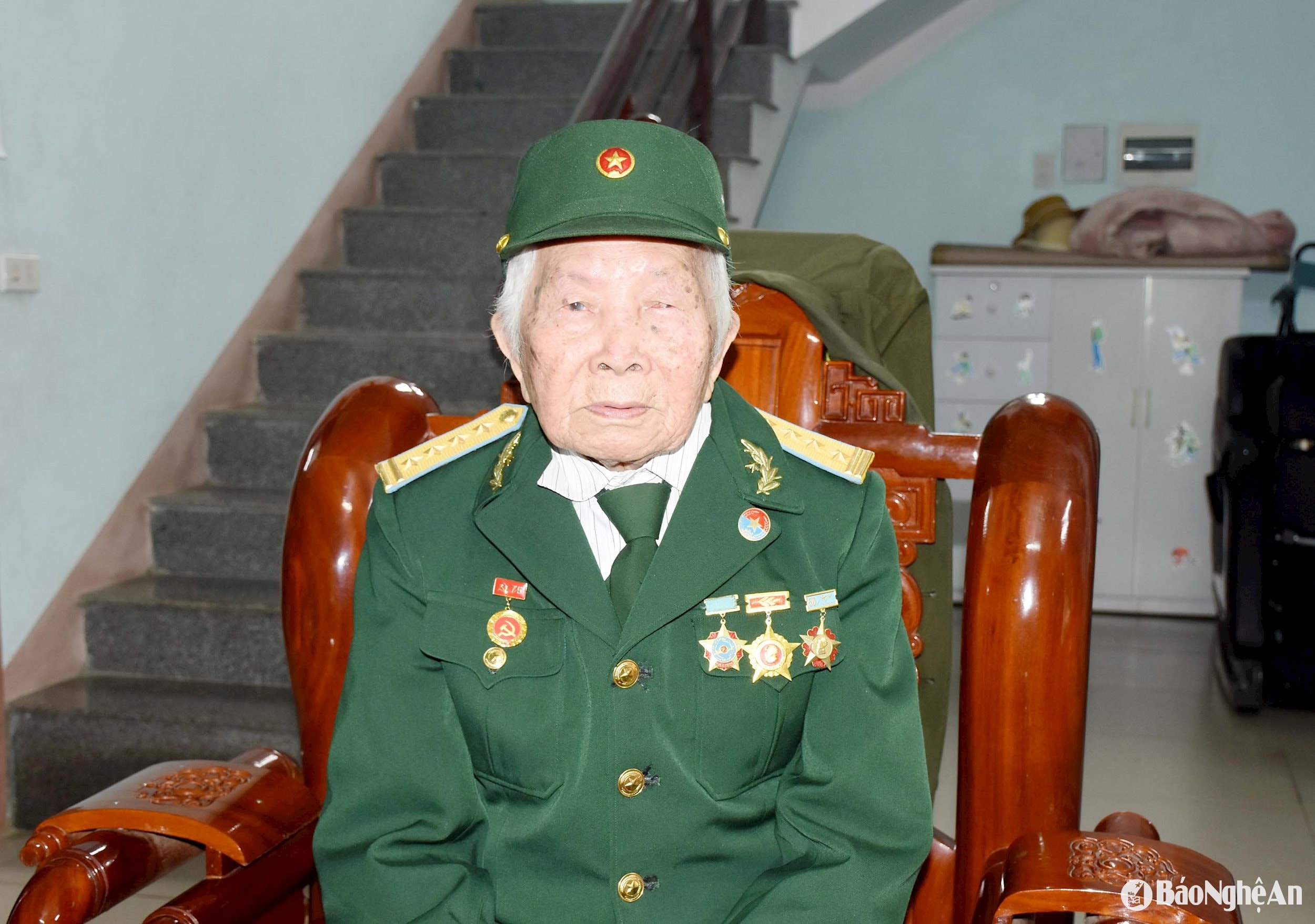The 'centenarians' at the estuary
In the endless flow of time, human health and life are limited, so people who live over 100 years old are considered to have longevity. We had the opportunity to meet two old men in the coastal area of Nghi Loc district who have passed the threshold of a hundred years old, over 100 years old and still quite lucid, still remembering clearly about the stages of their lives.
.png)
Cong Kien• March 4, 2025


The first person we met was Mr. Tran Van Coi (born in 1913) in Trung Tien hamlet, Nghi Quang commune (Nghi Loc). In the year of At Ty 2025, Mr. Coi turned 112 years old, an age very few people can reach. When a guest came to visit, Mr. Tran Dinh Phong (Mr. Coi's nephew) called his grandfather. Mr. Coi slowly sat up from bed to chat. He said: "Last Tet, my grandchildren took me to the Commune Cultural House to receive a 112th birthday wish from the Chairman of the Provincial People's Committee. After that, when I returned home, my children, grandchildren, and great-grandchildren celebrated my birthday very happily."

According to Mrs. Coi, her childhood was very difficult. Her father died early, and not long after, her mother remarried. She had to work as a servant for a rich family in the village. She lived a lonely and lonely life, so people often called her "Coi". That name has followed her throughout her life, until today.
In his youth, Mr. Coi was mobilized to join the frontline laborers, transporting food and weapons to the Northwest battlefield to support our troops in fighting the French, through the locations of Lao Cai, Yen Bai, and Son La. He was also present in the laborers' group supporting the Dien Bien Phu battlefield, carrying more than 100 kg of rice over mountains and passes to Dien Bien in time before the campaign began. His memory still remembers the image of our troops escorting groups of French prisoners of war through forest trails, and the scene of Dien Bien people rejoicing in victory.

After completing his mission, Mr. Tran Van Coi returned to his hometown and married Mrs. Nguyen Thi Phuong, a woman from the same village. At that time, his family was a farmer, plowing and harrowing all year round, attached to the fields and alluvial land. The couple had 8 children, 4 of whom joined the army and all returned safely. To date, Mrs. Nguyen Thi Phuong has been dead for 17 years, 4 of her 8 children have also passed away due to old age. Mr. Tran Van Coi currently lives with his youngest daughter-in-law, Mrs. Vo Thi Binh (his youngest son who passed away), next to his grandson, Mr. Tran Dinh Phong. Despite his old age, he still uses a cane to walk around the house, is self-sufficient in personal activities and eats moderately. Usually, breakfast is a package of instant noodles, lunch and dinner is a bowl of rice with soft-cooked meat or fish, and in between meals he can eat a banana.


Currently, our grandfather has 29 grandchildren, 73 great-grandchildren and 5 great-great-grandchildren who are working and living in many rural areas across the country. During the recent Lunar New Year, many grandchildren and great-grandchildren returned to Nghi Loc to celebrate their grandfather's birthday. He was very happy and hoped to continue living a healthy life to see his grandchildren and great-grandchildren grow up.
Mr. Tran Dinh Phong

Leaving Nghi Quang commune, we continued to Trung Den hamlet, Khanh Hop commune (Nghi Loc district) to meet Mr. Nguyen Manh Hong (born in 1923). At the age of 102, Mr. Hong still moves around and lives in the house, visits neighbors by controlling his wheelchair, still hears clearly enough to chat with people and watch TV to keep up with current events.
I am a retired Army Colonel, always proud to have witnessed the glorious moments of the country. That is participating in the Dien Bien Phu campaign and being present in Saigon after the liberation day"
Mr. Nguyen Manh Hong
Mr. Nguyen Manh Hong recounted that: Like many people in Khanh Hop, when he was young, he helped his parents herd buffalo and cut grass; when he was young, he studied and worked as a carpenter. At the age of 22, Mr. Hong joined the army, began his journey to fight against foreign invaders, following each campaign. During the resistance war against the French, that soldier was present in major campaigns such as Hoa Binh, Tay Bac, and then advanced to liberate Dien Bien (May 1954).


After the Geneva Agreement, the Army sent elite officers and soldiers to study at Air Force schools in socialist countries. Mr. Hong was one of those selected to study in the Soviet Union, then China. In 1965, after completing his training program and returning at the time when the US escalated its bombing of the North, Air Force officer Nguyen Manh Hong was assigned to Regiment 919 - the first Air Force Regiment of the Vietnam People's Army; then he joined the ranks of Fighter Regiment 921 (Division 371), participating in service, guiding, developing combat plans and commanding squadrons to defend the skies of the North.
In particular, Mr. Nguyen Manh Hong always remembers the Quyet Thang squadron nearly 50 years ago. When the Ho Chi Minh campaign was about to begin, Mr. Hong and more than 60 members of the working group were sent by the Air Defense - Air Force Command to the South to carry out their mission. In early April 1975, after Da Nang was liberated, he and the members of the working group took over the airport and deployed a plan to take enemy aircraft to fight back.

Following orders from superiors, the army's skilled technical staff and the Republic of Vietnam's technical soldiers presented themselves to coordinate the selection and repair of the A-37s, which were relatively good war trophies. After that, they continued to Phu Cat airport (Binh Dinh province) to urgently carry out preparations and training. After the preparations and training were completed, the A-37s and the Quyet Thang squadron, including pilots Nguyen Thanh Trung, Tu De, Nguyen Van Luc, Hoang Mai Vuong, Tran Van On and Han Van Quang, moved to Thanh Son airport (Ninh Thuan province) to carry out the mission of taking off and bombing Tan Son Nhat airport.
Mr. Nguyen Manh Hong was assigned by his superiors to stay at Phu Cat airport, ready to support his teammates at Thanh Son airport when ordered. “When his teammates left, we at Phu Cat were extremely nervous, watching every minute and every second. Early in the evening of April 28, receiving news from Thanh Son airport, 5 A-37s and the Quyet Thang squadron had landed safely a few minutes earlier, completing the mission excellently, we all rushed out and hugged each other. There were no words to describe the joy,” Mr. Hong said. Two days after the liberation of Saigon, following orders from his superiors, Mr. Hong was present at Tan Son Nhat airport to take over, arrange and handle all kinds of spoils of war.

After the liberation of the South, Mr. Nguyen Manh Hong continued to work in the aviation industry, with the highest position being Deputy General Director of Northern Aviation. After 40 years in the military, in 1987, he retired with the rank of Colonel. Returning to his hometown, enjoying time with his children and grandchildren, he still actively participated in social activities, contributing more of his intelligence to the development of his homeland.
Mr. Nguyen Manh Hong and his wife Vu Thi Thuc (95 years old) have 4 children, 9 grandchildren and 5 great-grandchildren. They currently live with their eldest son Nguyen Quoc Huy and his wife. The family has 4 generations living together happily, always filled with joy. When asked about the secret to a healthy and long life, Mr. Hong replied: "The most important thing is a moderate diet, eating lots of green vegetables and exercising diligently!"
